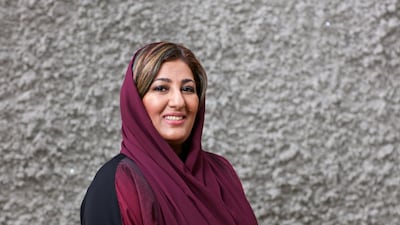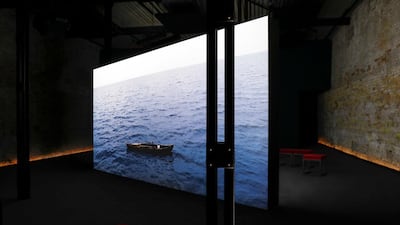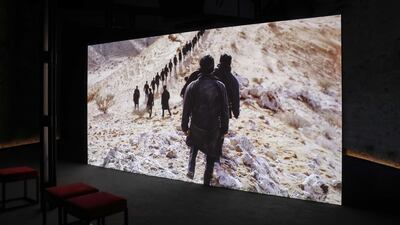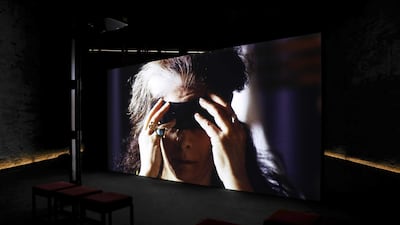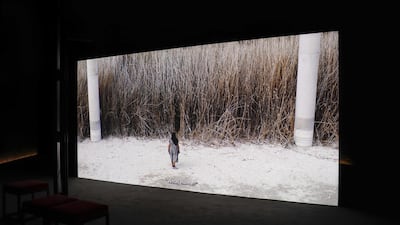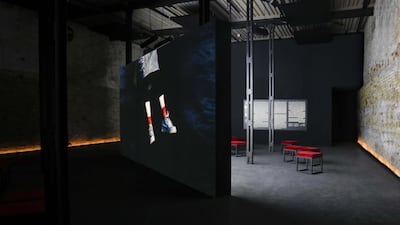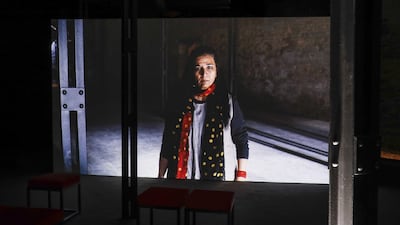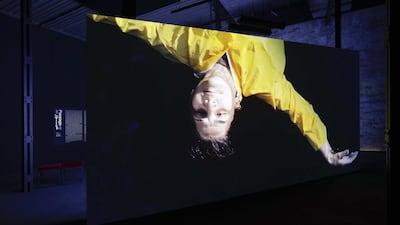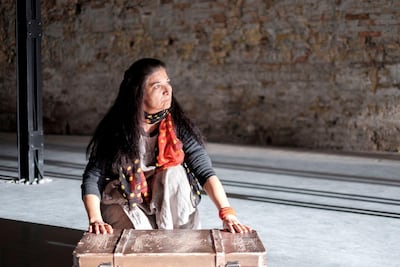Nujoom Alghanem was an unusual selection to represent the UAE at the Venice Biennale's National Pavilions, the art competition in which each country vies for the Golden Lion: the Dubai figure is known mostly as a poet and filmmaker. But in other ways she is a consummate representative: though Arab-language poetry and filmmaking that do not regularly travel on the international art circuit, it has been crucial to the development of the cultural scene in the young country.
Alghanem started as a poet in the Dubai and Sharjah literary circles of the 1980s and '90s, and then began a long film-making career, through which she has built a cast of alternative UAE heroes: sea-singers and artists, actors and quietly feminist camel herders.
Alghanem's video installation at Venice, Passage, picks up on her previous work in both poetry and film: the soundtrack is partly composed of her 2009 poem The Passerby Collects the Moonlight, and it reprises a relationship with the Syrian actor who starred in her 2011 film Amal. In deeper ways as well, it holds on to Alghanem's beginnings in poetry. While it takes stock of the way it is displayed and its physical effects on the viewers — a successful shift into an art-making language — it is suffused by the allusive atmosphere of poetry, highlighting language as a subject and privileging an affective mode of expression.
Alghanem worked with the curators Sam Bardaouil and Till Fellrath to create the immersive installation in the Venice pavilion. The video is in two channels that are projected onto either side of a screen that bisects the room. One screen shows what the curators call the "fiction" side, of the character Falak who searches across desolate landscapes for her home. The other side shows the "reality", of Alghanem and Amal, the actress who plays Falak, in Dubai as they prepare to make the film.
The device of the screen is a canny move by the filmmaker, toying with the viewer's desire to know what's hidden from them. “It’s all about curiosity,” one visitor remarked.
Throughout the video’s 25 minutes, I watched as viewers stealthily crept over to see what was happening on the other channel of the film. But you can’t see both at the same time: it keeps you moving, almost cruelly, from side to side.
Language also emerges as a subject of the work, in a political subtext. At the end of the video, Falak lapses into nonsensical language, with clothes strewn across the desert as she seems to drown in the sea. The contemporary experience of passages in the Arab world is a fraught one: the crisis of migration across the Mediterranean, the feeling of exile, and even the deep humiliation of passing through an airport and being singled out as Arab. Language is key to all of these.
“Language is a home but can be a challenge,” she says. “For the displaced, people are identified by their language. For the displaced, language is dangerous.
"As soon as they are identified, they might go through more challenges.
"So for the displaced person, for those who are running away, it is better for them not to speak. They start absorbing, absorbing, absorbing until they become crazy.
"And that’s what happens to Falak in the film. By the time she starts speaking, she is unable to speak a recognised language.”
Though the reality/fiction dichotomy is a shade programmatic, it exemplifies the capacity of poetry — still Alghanem's true subject — to work as both metaphor and pointed critique. The video ends on the apparent drowning, or floating, on one side, of Falak, and on the other slowed down footage of Dubai.
Alghanem says she wanted to ground the film in its reality: "to show that the fiction was a made-up scene, but also that fiction then becomes a new reality."
The story of Falak becomes the larger story of Dubai, its role as a place of migrant labour as well as a site of cultural production. At the same time, Alghanem plays with the ontological difference between fiction and reality: a question largely evaded by contemporary art, and almost surprising to encounter in the biennial.
“Fiction is made of signs but also of real things," Alghanem underlines. "Only poetry, only art can express this."
The Venice Biennale 2019 runs from Saturday until November 24
